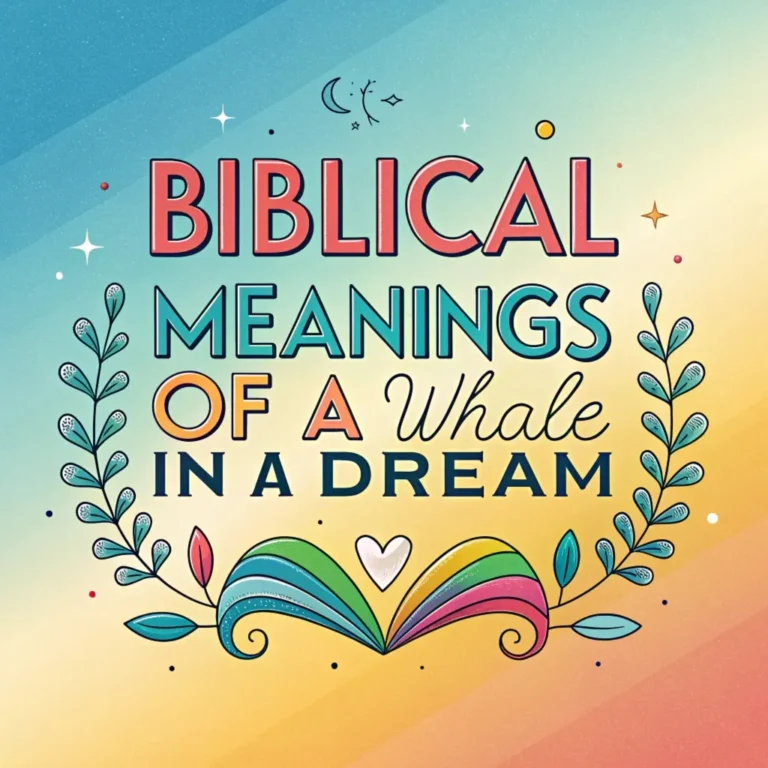Biblical Meaning of Jeshurun: A Name with Strong Christian Significance
As you explore the pages of the Bible, you come across a name that stands out – Jeshurun. It’s a poetic title for Israel, but what does it really mean? You discover that it’s derived from the Hebrew word ‘yashar,’ implying moral uprightness and justice.
This name is more than just a label; it’s a reflection of Israel’s covenantal identity and their responsibility to uphold righteousness.
But why does God use this name to address His people in Deuteronomy? What’s the significance of Jeshurun in understanding Israel’s role as a nation, and what can you learn from this ancient title about God’s heart for His people?
Biblical Meaning of Jeshurun In a Nutshell

- Jeshurun, meaning upright or just, reflects the Israelites’ commitment to justice and righteousness, emphasizing their moral rectitude.
- The name Jeshurun is used in Deuteronomy to address Israel, highlighting their privileged status as God’s chosen people and covenantal obligations.
- Jeshurun symbolizes God’s affection and care for Israel, conveying chosenness, provision, redemption, and faithfulness.
- As a just nation, Israel is called to embody values of justice, compassion, and righteousness, demonstrating moral authority among nations.
- Jeshurun represents the idealized Israel, unblemished and faithful to God’s commandments, highlighting the dynamic interplay between divine election and human responsibility.
Etymology of the Name Jeshurun
As you excavate into the etymology of the name Jeshurun, you’ll discover a rich tapestry of ancient origins and historical significance.
The name Jeshurun, bestowed upon Israel in Deuteronomy 32:15 and 33:5, 26, and Isaiah 44:2, originates from the Hebrew word ‘yashar,’ meaning upright or just, suggesting a profound connection between the people and their righteous heritage.
This etymological link highlights the importance of moral rectitude in the Israelites’ self-identity.
You’ll find that the name Jeshurun isn’t simply a designation, but a reflection of the people’s commitment to justice and righteousness.
As you examine the historical context, you’ll realize that the name Jeshurun emerges during a pivotal moment in Israel’s history, when the nation was grappling with its relationship with God.
The use of this name signifies a deeper understanding of the people’s covenantal obligations and their responsibility to uphold the principles of justice and morality.
Biblical Usage and Context
As you plunge into the Biblical meaning of Jeshurun, understanding its usage and context is vital.
In Deuteronomy 32:15 and 33:5, 26, the name Jeshurun is employed by Moses to address Israel, emphasizing their privileged status as God’s chosen people. This title is reserved for Israel when they’re in a right relationship with God, highlighting their unique position as the recipients of Divine affection.
As you explore the Biblical context, you’ll notice that Jeshurun is often associated with:
Biblical symbolism, where Israel is portrayed as a treasured possession, set apart for God’s purposes.
A sense of covenant, emphasizing Israel’s role as God’s chosen people, bound by a sacred agreement.
A tone of endearment, conveying God’s deep affection and care for His people.
A call to obedience, as Israel is reminded of their responsibilities as God’s chosen nation.

Significance in Deuteronomy 32
In Deuteronomy 32, the term Jeshurun takes on profound significance, underscoring Israel’s privileged status as God’s treasured possession, particularly in the song of Moses, where it serves as a poignant reminder of their covenant obligations.
As you explore into this chapter, you’ll discover that Jeshurun is used to emphasize Israel’s unique relationship with God, highlighting their responsibility to remain faithful to the covenant.
Moses’ lamentation in this song is a powerful expression of God’s disappointment and sorrow over Israel’s disobedience.
The use of Jeshurun in this context underscores the gravity of their actions, as they’d neglected their covenant obligations and turned to idolatry.
You’ll notice that the significance of Deuteronomy 32 lies in its emphasis on Israel’s accountability to God, and Jeshurun serves as a potent symbol of this accountability.
As you reflect on Moses’ lamentation, you’ll realize that Jeshurun is more than just a poetic term – it’s a reminder of the consequences of disobedience and the importance of remaining faithful to God’s covenant.
God’s Endearment Towards Israel
Through the tender epithet Jeshurun, God’s endearment towards Israel is palpable, conveyed through a tone of affection and longing that underscores the depth of their covenant bond.
As you explore into the scriptures, you’ll discover that this term isn’t just a casual reference, but a term of endearment that speaks to the very heart of God’s relationship with Israel.
God’s divine affection towards Israel is multifaceted, and Jeshurun highlights several aspects of this belovedness:
- Chosenness: You’re reminded that Israel was chosen by God, set apart as a treasured possession among all nations.
- Provision: God’s provision for Israel is evident in the wilderness, where He supplied their every need, demonstrating His care and concern for their well-being.
- Redemption: Through Jeshurun, you see God’s redemptive power at work, as He delivers Israel from slavery and oppression, demonstrating His mighty arm on their behalf.
- Faithfulness: God’s faithfulness to Israel is unwavering, even in the face of their disobedience, highlighting His enduring commitment to their covenant relationship.
As you reflect on God’s endearment towards Israel, you’re reminded of the depth of His love and the significance of your own relationship with Him.
Israel as a Just Nation
What does it mean for Israel to be a just nation, and how does this identity shape their understanding of God’s covenant and their role within it?
As you examine the concept of Jeshurun, you’ll discover that being a just nation is fundamental to Israel’s sense of national pride. This identity is rooted in their understanding of God’s covenant, which emphasizes justice, compassion, and righteousness.
As a just nation, Israel is called to embody these values, demonstrating moral authority in their interactions with other nations.
This identity shapes Israel’s understanding of their role within God’s covenant. They recognize that their actions have consequences, not just for themselves, but for the entire world.
By living according to God’s standards, Israel believes they can bring blessings to all nations. Conversely, when they fail to uphold justice and righteousness, they risk forfeiting their status as a just nation.
As you explore the concept of Jeshurun, you’ll see how Israel’s pursuit of justice and moral authority is intricately tied to their understanding of God’s covenant and their place within it.
Jeshurun in Hebrew Poetry
As you delve into the rich tapestry of Hebrew poetry, you’ll find that Jeshurun emerges as a powerful symbol of Israel’s covenantal identity, its usage evoking a profound sense of national pride and moral responsibility.
Within this framework, Jeshurun is more than just a poetic name for Israel; it’s a symbol of the nation’s sacred bond with God.
Through Hebrew imagery and poetic symbolism, Jeshurun is often depicted as a people chosen by God, set apart for a divine purpose.
This imagery is woven throughout various poetic genres, including:
- Psalms of praise, where Jeshurun is celebrated as a nation blessed by God
- Wisdom literature, where Jeshurun is portrayed as a people called to live according to God’s wisdom
- Prophetic oracles, where Jeshurun is admonished to return to its covenantal roots
- Lamentations, where Jeshurun’s failures are mourned and its restoration is longed for
In Hebrew poetry, Jeshurun embodies the complex and multifaceted nature of Israel’s relationship with God, serving as a powerful reminder of the nation’s sacred calling and its moral obligations.
Israel’s Identity Crisis
Israel’s identity crisis emerged when its covenantal identity, symbolized by Jeshurun, was threatened by the tension between its divine calling and its earthly realities.
As a nation, Israel was chosen by God to be a light to the nations, but its historical experiences and cultural influences often pulled it in different directions.
This internal conflict led to a crisis of national identity, where Israel struggled to reconcile its sacred calling with its secular existence.
As you probe further into this crisis, you’ll find that it’s rooted in Israel’s quest for self-discovery.
The nation grappled with questions like: ‘Who are we, really?’ and ‘What does it mean to be God’s chosen people?’
This search for identity led to a crisis of faith, where Israel questioned its relationship with God and its purpose in the world.
The struggle to define its national identity was, fundamentally, a struggle to understand its place in the divine narrative.
God’s Affection in Scripture
Through the biblical narrative, God’s affection for Jeshurun is revealed in the tender language and metaphorical imagery that permeate the scriptural accounts of their relationship.
God’s love for Jeshurun isn’t a distant or abstract concept, but a deeply personal and intimate reality.
As you explore the Scriptures, you’ll discover that God’s affection is woven into the very fabric of their interactions.
Some examples of this include God’s gentle whispers to Jeshurun, speaking words of comfort and reassurance in times of need.
The metaphor of God as a loving husband, highlighting the depth of His devotion and commitment to Jeshurun.
The imagery of God as a shepherd, guiding and protecting Jeshurun with tender care.
The repeated use of affectionate terms, such as ‘my treasured possession‘ and ‘my delight‘, emphasizing God’s Sacred Affection for Jeshurun.
Through these examples, you gain insight into the Divine Intimacy that exists between God and Jeshurun, a relationship that transcends mere duty or obligation.
As you excavate deeper into the Scriptures, you’ll come to understand the profound implications of this affection for your own life, and the freedom that comes from experiencing God’s love in a deeply personal way.
Unpacking the Concept of Yashar
Yashar is a concept that sheds light on the very nature of Jeshurun’s relationship with God, revealing the characteristics that define this beloved people.
It’s deeply connected to the idea of moral fiber. Fundamentally, Yashar represents the upright and righteous character that God desires in His people. It’s the embodiment of a strong moral compass, one that guides individuals to live according to God’s principles and commands.
When you examine the Hebrew scriptures, you’ll find that Yashar is often associated with words like ‘straight’ or ‘upright,’ conveying a sense of moral integrity and righteousness.
This concept is deeply rooted in God’s desire for His people to reflect His character, demonstrating a commitment to justice, compassion, and faithfulness.
As you explore the concept of Yashar, you’ll gain a deeper understanding of the qualities that define Jeshurun, and how they can be cultivated in your own life, leading to a more profound and authentic relationship with God.
Just and Upright in the Bible
As you explore into the concept of Jeshurun, you’ll discover that being just and upright is a recurring theme in the Bible.
In the biblical narrative, the righteous character of Jeshurun is exemplified in the lives of individuals who embodied justice and uprightness, such as Noah, Abraham, and Joseph, whose stories serve as powerful attestations to the enduring value of moral rectitude.
These individuals demonstrated that living a life of integrity and fairness isn’t only possible but also necessary for building a society that values freedom and equality.
As you reflect on their stories, you’ll notice some common characteristics that made them stand out as righteous leaders and faithful servants:
- They lived according to God’s laws and principles, even when it was difficult or unpopular.
- They demonstrated compassion and empathy towards others, especially the marginalized and oppressed.
- They were transparent and honest in their dealings, even when it was challenging.
- They remained humble and accountable, recognizing their limitations and seeking guidance from God.
Israel’s Unique Relationship
In contrast to the righteous individuals who exemplified justice and uprightness, Israel’s unique relationship with God is characterized by a covenantal bond that sets them apart as a chosen people.
You, as a seeker of freedom, may wonder what sets Israel apart from other nations. The answer lies in their national identity, forged through a divine covenant that bestowed upon them a unique status.
This covenantal bond is rooted in God’s divine favor, which manifests in Israel’s history as a series of miraculous interventions and salvific acts.
As you plumb deeper into Israel’s story, you’ll discover that their national identity is inextricably linked to their covenant with God.
This identity isn’t solely defined by their adherence to moral standards, but rather by their recognition of God’s sovereign authority over their lives.
Through this covenant, Israel receives a special status, marked by God’s promise to bless and protect them.
This divine favor, in turn, instills in them a sense of purpose and responsibility, shaping their collective identity and informing their relationship with the world.
Jeshurun in Jewish Tradition
As you plunge into the concept of Jeshurun, you’ll discover that its significance extends beyond the biblical narrative. The Hebrew Bible‘s term ‘Jeshurun’ is first introduced in Deuteronomy 32:15 and 33:5, where it’s used to describe the Israelites as a treasured and cherished people, emphasizing their unique status within the covenantal bond.
In Jewish tradition, Jeshurun takes on a richer meaning, reflecting the complexities of the Israelite identity.
Rabbinic insights suggest that Jeshurun represents the idealized Israel, unblemished and faithful to God’s commandments.
Talmudic references to Jeshurun highlight the tension between the Israelites’ potential for greatness and their propensity for sin.
In Midrashic literature, Jeshurun is often depicted as a symbol of Israel’s covenantal relationship with God, emphasizing the reciprocal nature of their bond.
Some Jewish commentators interpret Jeshurun as a call to spiritual excellence, urging the Israelites to aspire for moral and ethical perfection.
As you explore these diverse perspectives, you’ll gain a deeper understanding of the multifaceted nature of Jeshurun, and its enduring significance in Jewish thought and tradition.
Theological Implications of Jeshurun
The concept of Jeshurun yields profound theological implications, particularly in its emphasis on the dynamic interplay between divine election and human responsibility within the covenantal framework.
As you plunge into the meaning of Jeshurun, you’ll discover that it highlights the tension between God’s sovereign choice and humanity’s agency in responding to that choice.
This tension is pivotal in understanding the divine relationship, where God initiates and sustains the connection, and humanity responds with faithfulness and obedience.
In this framework, Jeshurun represents a faithful community that acknowledges and honors God’s election.
You see, being part of this community means recognizing that your identity is rooted in God’s choice, rather than your own merits or achievements.
This understanding fosters a deep sense of humility and gratitude, as you acknowledge that your relationship with God is a gift, rather than something you’ve earned.
As you explore the theological implications of Jeshurun, you’ll find that it underscores the importance of responsive obedience to God’s will.
Comparing Jeshurun and Israel
You’re likely wondering how Jeshurun, a term that emphasizes God’s sovereign election, relates to Israel, a name that highlights the covenantal community’s responsiveness to God’s will. While both terms refer to the same people, they convey distinct aspects of their identity.
Some key differences exist between the two terms:
- Covenant heritage: Israel emphasizes the nation’s responsibility to uphold the covenant, whereas Jeshurun highlights God’s sovereign initiative in choosing and redeeming His people.
- National pride: Israel is often associated with national pride and identity, whereas Jeshurun underscores the people’s dependence on God’s mercy and grace.
- Focus: Israel tends to focus on the people’s actions and responses, whereas Jeshurun centers on God’s electing love and redemptive work.
- Tone: Israel can evoke a sense of accomplishment and pride, whereas Jeshurun conveys a sense of humility and gratitude.
As you explore the biblical meaning of Jeshurun, it is crucial to understand these nuances and how they enrich our understanding of God’s relationship with His people.
Symbolism in Modern Christianity
In modern Christian practices, Jeshurun’s symbolism is often employed to convey a deeper sense of dependence on God’s sovereignty, transcending the more triumphalistic connotations associated with the term Israel.
As you explore into the biblical meaning of Jeshurun, you’ll discover that it embodies a more humble and surrendered posture before God.
This symbolism is particularly significant in today’s Christian values, where faith expressions often prioritize self-reliance and individual achievement.
Frequently Asked Questions
Is Jeshurun a Common Name in the Hebrew Bible?
You’ll find that Jeshurun isn’t a common name in the Hebrew Bible, but rather one of Israel’s biblical nicknames, derived from Hebrew etymology, symbolizing upright and just, emphasizing the nation’s ideal character and divine destiny.
What Is the Difference Between Jeshurun and Israelite?
As you explore the distinction between Jeshurun and Israelite, you’ll find that Jeshurun represents a cultural identity rooted in national pride, emphasizing the people’s connection to their land and heritage, whereas Israelite denotes a broader, more general affiliation.
Is Jeshurun a Metaphor for the Church in Christianity?
You explore Church typology, wondering if Jeshurun symbolizes the Church in Christianity, representing a Spiritual identity of redeemed believers, freed from sin’s bondage, embracing their new nature in Christ.
Does Jeshurun Imply a Specific Geographical Location?
You’re wondering if Jeshurun implies a specific geographical location. Analyzing the term, it’s clear that Jeshurun doesn’t explicitly pinpoint a place, but rather symbolizes the collective experience of Israel’s desert wanderings and eventual entry into the Promised Land.
Is Jeshurun Mentioned in Non-Biblical Ancient Texts?
You’ll find that Jeshurun is absent in non-biblical ancient texts, with no mentions in Ancient Mesopotamian texts or Assyrian inscriptions, suggesting its origins may be unique to the biblical narrative, warranting further investigation.

Hi, I’m Aurelia Starfrost, your spiritual guide at InsightfulSpiritual.com. I love exploring ancient wisdom and modern practices to help you on your journey. With a focus on meditation and energy healing, I’m here to guide you to find solace within and discover your spiritual essence.







